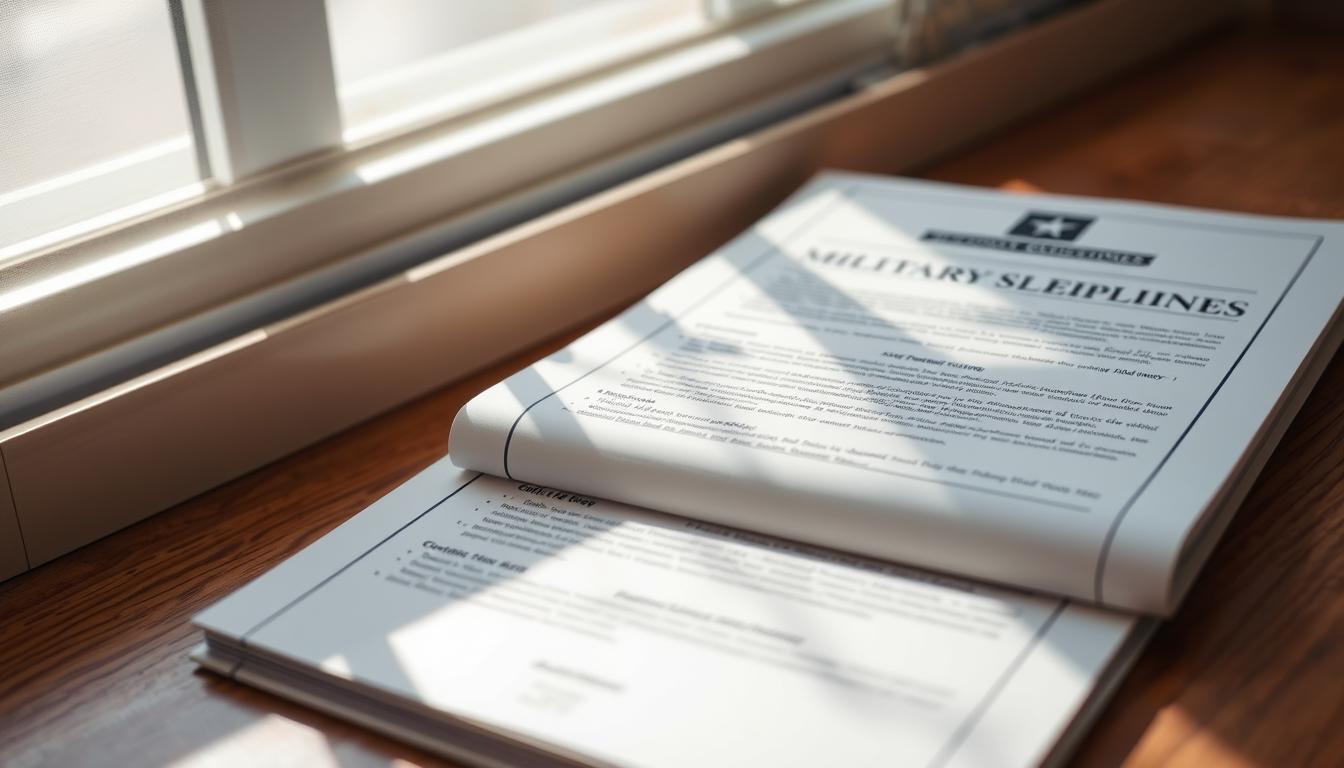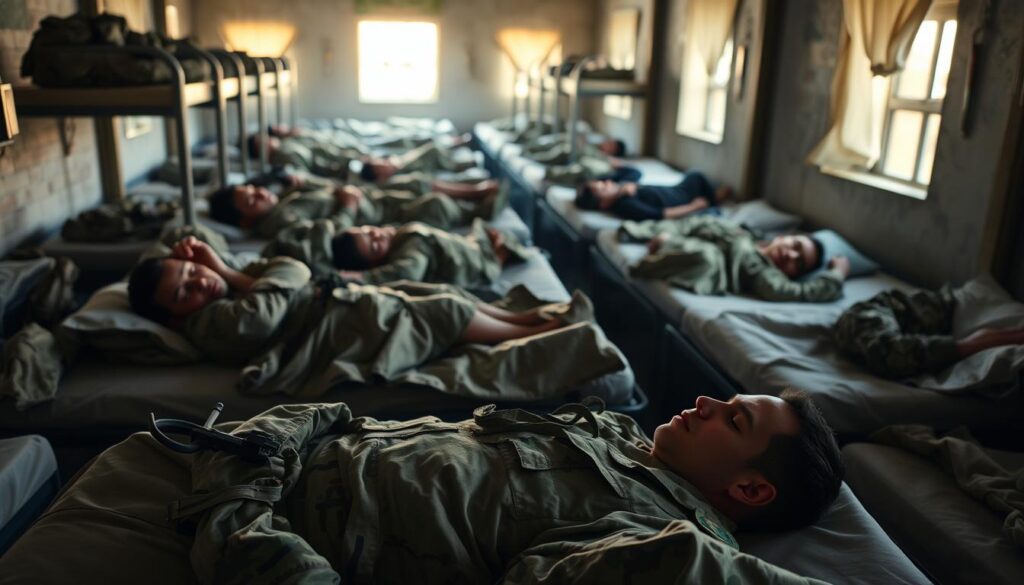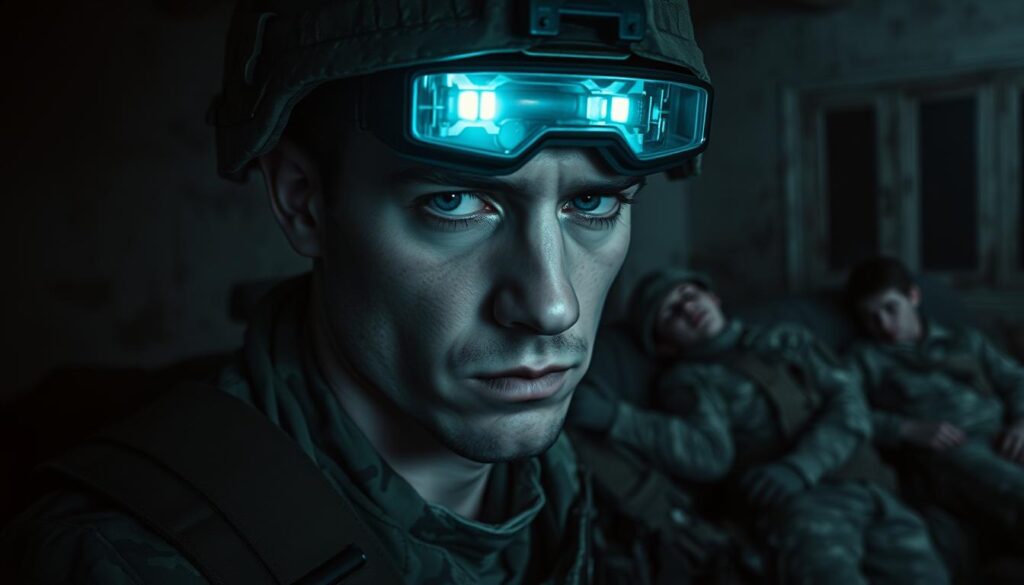Can a good night’s rest be the key to a soldier’s success on the battlefield? The Department of the Army has recently introduced new guidelines. They emphasize the importance of adequate rest for soldiers.
The new policy mandates that soldiers assigned to staff duty must get a minimum of four hours of rest during their shifts. This move acknowledges the critical role that quality sleep plays in soldier performance, health, and safety.
The demanding schedule and lack of rest have long been characteristic of military life. However, recent studies have highlighted the need for better military sleep guidelines. They ensure soldiers are well-rested and prepared for duty.
Key Takeaways
- The Department of the Army has introduced new sleep guidelines for soldiers.
- Soldiers on staff duty must get at least four hours of rest.
- Adequate rest is crucial for soldier performance, health, and safety.
- The new policy aims to improve soldier sleep patterns.
- Better sleep guidelines are essential for military readiness.
Overview of Sleep Needs in the Army
Sleep is key in the Army’s Performance Triad, along with activity and nutrition. It’s vital for keeping soldiers healthy and ready. Knowing how much sleep soldiers need is important for their success.
Importance of Sleep for Soldiers
Sleep is vital for soldiers’ physical and mental health. Adequate sleep helps them stay alert and makes them better at making decisions. Many U.S. adults and soldiers don’t get enough sleep, which is a problem.
“Sleep is a critical component of soldier readiness,” the Army says. It’s essential for soldiers to get enough sleep to perform well and stay healthy.
Factors Affecting Sleep Quality
Many things can affect soldiers’ sleep, like their work schedule and where they sleep. Operational demands can disrupt their sleep. Things like noise and temperature also play a big role.
- Operational demands and irregular schedules
- Environmental conditions such as noise and temperature
- Personal stress and mental health
Average Sleep Duration for Soldiers
The Army Public Health Center’s 2021 report shows a problem. Only 38 percent of soldiers sleep for seven hours or more during workweeks. This shows how hard it is for soldiers to get enough sleep.
It’s important to understand these issues and the average sleep time for soldiers. By tackling these problems, the Army can help soldiers be more ready and perform better.
Sleep Standards Set by the Army
The Army’s sleep standards are designed for military life. Soldiers need enough rest to stay ready and perform well. Recent Army guidelines highlight the importance of sleep education and leadership in solving sleep issues.
Army Regulation on Sleep Requirements
The Army has strict rules for soldier sleep. For example, the 18th Airborne Corps requires staff duty soldiers to sleep for at least four hours straight. This shows the Army’s focus on optimal sleep for soldiers and how sleep is key for success.
“Sleep is crucial for soldier readiness,” Army leaders say. “It’s essential for their health and performance.” The Department of Defense also recommends seven or more hours of sleep daily for service members.
Recommended Sleep Hours for Different Roles
Different roles in the Army need different amounts of sleep. While most soldiers should aim for seven hours, some roles might need more or less. For example, soldiers in stressful or fast-paced jobs might need to adjust their sleep to fit their duties, following soldier rest guidelines.
- Commanders might need more sleep for better decision-making.
- Operational roles might adjust sleep based on mission needs.
- Support staff usually follow standard sleep guidelines, with some flexibility.
Variability in Sleep Needs Based on Mission
The Army knows that sleep needs change with the mission. In tough or long operations, soldiers might have to work with little sleep. But the Army stresses the need for recovery sleep to counteract sleep loss. Leaders are urged to plan for sleep as part of mission prep, ensuring soldiers stay healthy and perform well.
By following these sleep standards, the Army aims to boost soldier performance, cut down on fatigue, and improve overall health. Good sleep management is key to military readiness and success.
Consequences of Sleep Deprivation
Inadequate sleep can severely harm soldiers’ minds and bodies. The Army worries about sleep deprivation because it impacts soldiers’ performance, health, and safety. It also affects their ability to make good decisions.
Short-term Effects on Performance
Sleep deprivation can cause impaired cognitive function. This includes poor concentration, memory problems, and slower reaction times. In the short term, it can lead to lower performance and a higher risk of accidents.
A study showed that 24 hours without sleep is like having a 0.09 blood alcohol level. This makes it hard for soldiers to do their jobs safely and well.
Long-term Health Implications
Long-term sleep deprivation can harm health. It increases the risk of heart disease, diabetes, and obesity. It can also cause mental health problems like depression and anxiety.
Soldiers and military leaders need to know these risks. They must make sleep a priority to stay healthy.
| Health Condition | Risk Factor | Impact on Soldiers |
|---|---|---|
| Cardiovascular Disease | Chronic Sleep Deprivation | Increased risk of heart disease and stroke |
| Diabetes | Prolonged Sleep Deprivation | Increased risk of developing insulin resistance |
| Obesity | Sleep Quality Issues | Weight gain and related health issues |
Impact on Decision-Making and Safety
Sleep deprivation can impair decision-making. This leads to bad judgments and a higher risk of accidents. In the military, this can be very dangerous, affecting mission safety and success.
Leaders must understand these risks. They need to find ways to reduce them.
Strategies for Improving Sleep in Military Operations
The military needs new ways to help soldiers sleep well. Good sleep is key for their health, alertness, and work performance.
Creating Optimal Sleep Environments
It’s important to make sleep areas quiet, dark, and cool. Sleeping quarters should be designed to minimize noise and light exposure. Soldiers need earplugs, eye masks, or other tools to sleep well.
Utilizing Napping Techniques
Dr. Sara Alger says “tactical napping” helps with sleep loss. Short naps of 20-30 minutes can boost alertness and performance. They’re great for when soldiers are up for a long time.
| Nap Duration | Benefits | Best For |
|---|---|---|
| 20-30 minutes | Improves alertness, memory, and cognitive function | Short breaks during operations |
| 1.5-2 hours | Enhances creativity, improves problem-solving skills | Extended rest periods |
Stress Management and Relaxation Techniques
Stress management and relaxation are key for better sleep. Deep breathing, progressive muscle relaxation, and mindfulness meditation can reduce stress. They help soldiers relax and sleep better.
- Deep breathing exercises
- Progressive muscle relaxation
- Mindfulness meditation
By using these strategies, soldiers can handle sleep issues better. Leaders should support a sleep-friendly culture. They should give soldiers the tools to fight sleep deprivation.
Resources for Army Personnel
The Army has many resources to help soldiers sleep better. These resources follow the military sleep guidelines. They aim to help soldiers deal with sleep loss and get better sleep.
Sleep Health Support Initiatives
The Army and Armed Forces Wellness Centers offer health coaches and sleep education. They help soldiers meet the Army’s sleep needs. These efforts also support the Army Public Health Center’s sleep and fatigue management resources.
Tools for Managing Sleep
Soldiers can use tools to track their sleep and handle sleep issues. There are educational materials and workshops too. These teach the value of sleep and how to sleep better.
Using these resources, soldiers can sleep better and perform well. They follow the military sleep guidelines and Army sleep needs.



